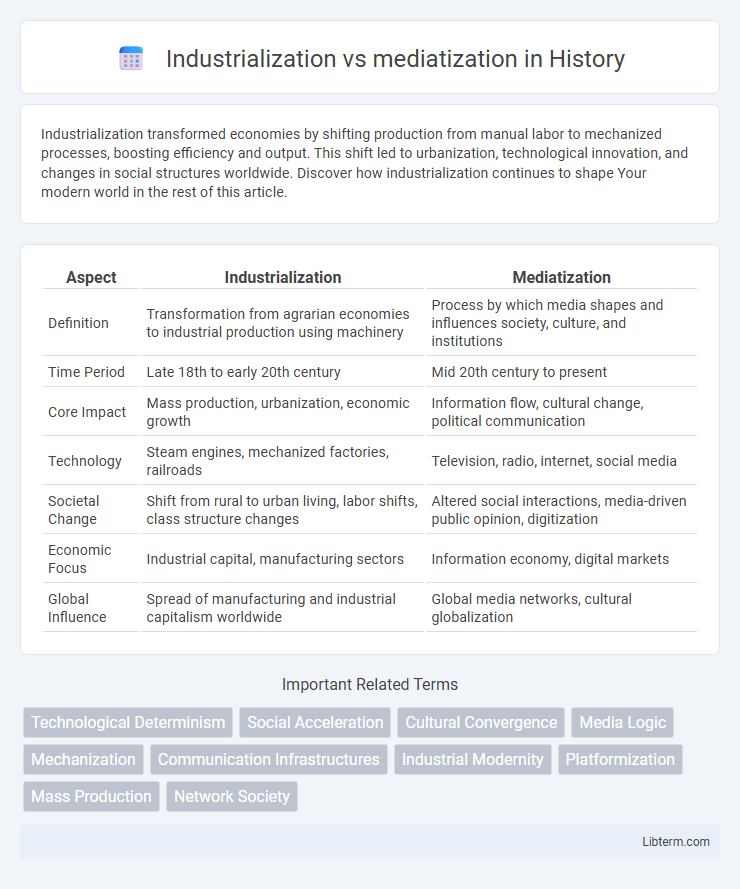Industrialization transformed economies by shifting production from manual labor to mechanized processes, boosting efficiency and output. This shift led to urbanization, technological innovation, and changes in social structures worldwide. Discover how industrialization continues to shape Your modern world in the rest of this article.
Table of Comparison
| Aspect | Industrialization | Mediatization |
|---|---|---|
| Definition | Transformation from agrarian economies to industrial production using machinery | Process by which media shapes and influences society, culture, and institutions |
| Time Period | Late 18th to early 20th century | Mid 20th century to present |
| Core Impact | Mass production, urbanization, economic growth | Information flow, cultural change, political communication |
| Technology | Steam engines, mechanized factories, railroads | Television, radio, internet, social media |
| Societal Change | Shift from rural to urban living, labor shifts, class structure changes | Altered social interactions, media-driven public opinion, digitization |
| Economic Focus | Industrial capital, manufacturing sectors | Information economy, digital markets |
| Global Influence | Spread of manufacturing and industrial capitalism worldwide | Global media networks, cultural globalization |
Defining Industrialization and Mediatization
Industrialization refers to the large-scale transformation of economies and societies through the development of industries, mechanized production, and technological innovation, fundamentally reshaping labor, urbanization, and economic structures. Mediatization describes the process by which media influence and permeate various aspects of social, cultural, and political life, altering communication practices and societal interactions. Understanding these concepts involves recognizing industrialization as primarily economic and infrastructural change, while mediatization centers on the expanding role and impact of media technologies and institutions.
Historical Context: From Factories to Media Networks
Industrialization marked the transformation from agrarian economies to factory-based production during the 18th and 19th centuries, driving urbanization and technological innovation. Mediatization refers to the growing influence of media networks in shaping social, political, and cultural processes, especially prominent since the late 20th century. The shift from physical industrial infrastructures to digital and networked media platforms highlights a fundamental change in how societies organize labor, communication, and information dissemination.
Key Drivers: Technology and Communication
Industrialization is driven primarily by advancements in manufacturing technologies, mechanization, and the development of infrastructure that enhance production efficiency and economic growth. Mediatization focuses on the evolution of communication technologies, such as digital platforms, social media, and mass broadcasting, which reshape societal interactions and cultural consumption. Both processes are propelled by innovations in technology, but industrialization centers on physical production, while mediatization transforms information dissemination and communication practices.
Societal Changes: Workforce vs. Information Flow
Industrialization transformed societal structures by shifting the workforce from agrarian labor to factory-based employment, leading to urbanization and the rise of wage labor economies. Mediatization reshaped societal information flow by embedding media technologies into daily life, accelerating communication and influencing public opinion across digital platforms. Together, these processes altered social dynamics by redefining labor relations and information dissemination patterns in modern societies.
Economic Impacts of Industrialization and Mediatization
Industrialization drives economic growth through mass production, increased labor specialization, and infrastructure development, resulting in higher GDP and job creation in manufacturing sectors. Mediatization influences economic activities by transforming marketing strategies, consumer behavior, and information dissemination, leading to the rise of digital economies and service-based industries. Both processes reshape labor markets and capital allocation, but industrialization primarily fuels traditional industrial expansion, while mediatization accelerates digital transformation and global market integration.
Cultural Shifts: Production vs. Perception
Industrialization transformed cultural production by mechanizing manufacturing processes, enabling mass dissemination of goods and standardizing cultural artifacts. Mediatization shifts focus to cultural perception, emphasizing how media technologies reshape social realities, influence public discourse, and alter consumption patterns through constant connectivity and real-time information flow. This transition underscores a movement from tangible industrial outputs to intangible media-driven experiences shaping collective consciousness.
Political Influence: Policy and Power Structures
Industrialization reshaped political influence by centralizing economic power, enabling governments to implement policies favoring manufacturing and infrastructure development that bolstered state control. Mediatization transformed political communication, where media platforms became critical arenas for shaping public opinion and policy decisions, altering power structures by increasing the influence of media conglomerates in political processes. The interplay between industrial capital and media power continues to redefine policy formulation and the balance of political authority in modern states.
Environmental Consequences: Material vs. Digital Footprints
Industrialization generates substantial environmental consequences through its extensive material footprint, characterized by high carbon emissions, resource extraction, and pollution from manufacturing processes. In contrast, mediatization primarily affects the environment via digital footprints, including energy consumption from data centers, electronic waste, and the carbon impact of network infrastructure. The shift from physical to digital economies reduces some ecological pressures but introduces new sustainability challenges linked to the expansion of information technology and digital communication systems.
Challenges and Opportunities in the Digital Age
Industrialization revolutionized production with mechanization, presenting challenges like labor displacement and resource depletion, yet created opportunities for economic growth and urbanization. Mediatization in the digital age reshapes social communication and cultural consumption, challenging traditional media business models while enabling unprecedented connectivity and information exchange. Navigating the transition requires addressing digital divides and privacy concerns while leveraging technological innovation for inclusive societal development.
Future Trends: Convergence of Industry and Media
The future trends in industrialization and mediatization point towards a seamless convergence where advanced manufacturing technologies integrate with digital media platforms to create smart, interconnected ecosystems. Industrial Internet of Things (IIoT) and artificial intelligence (AI) will drive real-time data exchange between production systems and media channels, enhancing customization, marketing strategies, and consumer engagement. This fusion will redefine operational efficiency and content distribution, fostering innovation across industries and reshaping the economic landscape.
Industrialization Infographic

 libterm.com
libterm.com